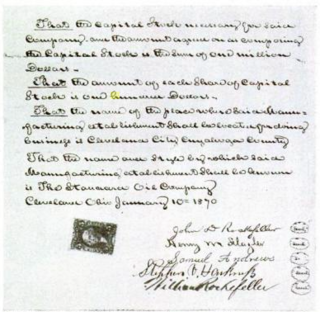Corporate titles or business titles are given to company and organization officials to show what duties and responsibilities they have in the organization. Such titles are used by publicly and privately held for-profit corporations. In addition, many non-profit organizations, educational institutions, partnerships, and sole proprietorships also confer corporate titles.
Olympus Corporation is a Japanese manufacturer of optics and reprography products. Olympus was established on 12 October 1919, initially specializing in microscopes and thermometers. Olympus holds roughly a 70-percent share of the global endoscope market, estimated to be worth approximately US$2.5 billion. Its global headquarters are located in Shinjuku, Tokyo, Japan.

Financial statements are formal records of the financial activities and position of a business, person, or other entity.

A financial audit is conducted to provide an opinion whether "financial statements" are stated in accordance with specified criteria. Normally, the criteria are international accounting standards, although auditors may conduct audits of financial statements prepared using the cash basis or some other basis of accounting appropriate for the organisation. In providing an opinion whether financial statements are fairly stated in accordance with accounting standards, the auditor gathers evidence to determine whether the statements contain material errors or other misstatements.
In a U.S. publicly traded company, an audit committee is an operating committee of the board of directors charged with oversight of financial reporting and disclosure. Committee members are drawn from members of the company's board of directors, with a Chairperson selected from among the committee members. A qualifying audit committee is required for a U.S. publicly traded company to be listed on a stock exchange. Audit committees are typically empowered to acquire the consulting resources and expertise deemed necessary to perform their responsibilities.

The auditor's report is a disclaimer thereof, issued by either an internal auditor or an independent external auditor as a result of an internal or external audit, as an assurance service in order for the user to make decisions based on the results of the audit.

International Standards on Auditing (ISA) are professional standards for the performance of financial audit of financial information. These standards are issued by International Federation of Accountants (IFAC) through the International Auditing and Assurance Standards Board (IAASB). According to Olung M ISA guides the auditor to add value to the assignment hence building confidence of investors.

Auditor independence refers to the independence of the internal auditor or of the external auditor from parties that may have a financial interest in the business being audited. Independence requires integrity and an objective approach to the audit process. The concept requires the auditor to carry out his or her work freely and in an objective manner.

Vinod Rai is a former Indian IAS officer who served as the 11th Comptroller and Auditor General of India. He assumed office on 7 January 2008 till 22 May 2013. He is the current chairman of UN Panel of External Auditors and Honorary Advisor to the Railways and a member of the Railway Kaya Kalp Council. He holds a master's degree in Economics from the University of Delhi, and Masters in Public Administration from Harvard University. He is widely considered as symbol of the anti-corruption movement and is credited with having turned the office of CAG into a powerful force for accountability and transparency in contemporary India.

German company law (Gesellschaftsrecht) is an influential legal regime for companies in Germany. The primary form of company is the public company or Aktiengesellschaft (AG). A private company with limited liability is known as a Gesellschaft mit beschränkter Haftung (GmbH). A partnership is called a Kommanditgesellschaft (KG).
The chief audit executive (CAE), director of audit, director of internal audit, auditor general, or controller general is a high level independent corporate executive with overall responsibility for internal audit.
Spółka z ograniczoną odpowiedzialnością, abbreviated Sp. z o.o., is the legal title of a limited liability company in Poland.
The Model Audit Rule 205, Model Audit Rule, or MAR 205 are the commonly applied terms for the Annual Financial Reporting Model Regulation. Model Audit Rule is a financial reporting regulation applicable to insurance companies, and borrows significantly from the Sarbanes Oxley Act of 2002. The Model Audit Rule is co-developed by the American Institute of Certified Public Accountants (“AICPA”) and National Association of Insurance Commissioners (“NAIC”) and issued by NAIC with revisions in 2006 and has taken effect in 2010.
Elke König is a German MBA in Business and auditor. From January 2012, she was president of the Federal Financial Supervisory Authority (BaFin); in December 2014, she became the first Chair of the newly established Single Resolution Board (SRB) of the Single Resolution Mechanism headquartered in Brussels.











